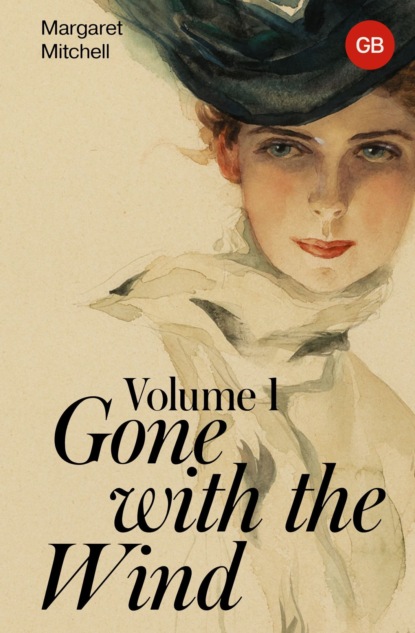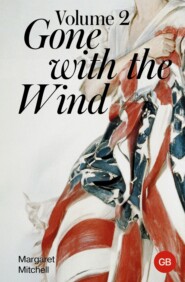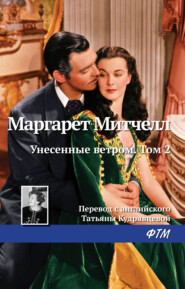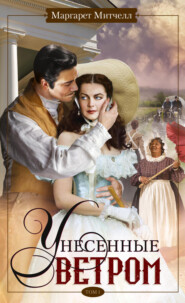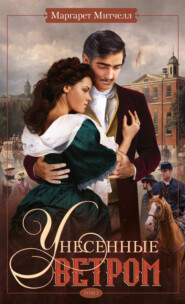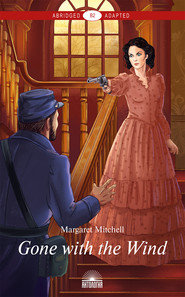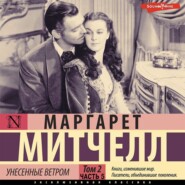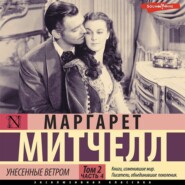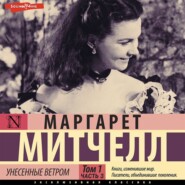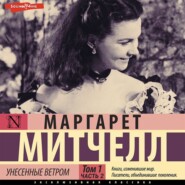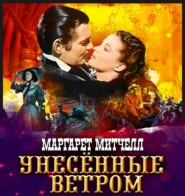По всем вопросам обращайтесь на: info@litportal.ru
(©) 2003-2024.
✖
Gone with the Wind. Volume 1 / Унесенные ветром. Том 1
Настройки чтения
Размер шрифта
Высота строк
Поля
“What a fool!” thought Scarlett bitterly, casting a surreptitious glance about her in the hope of being rescued from the conversation.
“Would you?”
“Oh-yes, indeed, Mr. Hamilton. Three Rosaries a night, at least!”
Charles gave a swift look about him, drew in his breath, stiffened the muscles of his stomach. They were practically alone and he might never get another such opportunity. And, even given another such Godsent occasion, his courage might fail him.
“Miss O'Hara-I must tell you something. I–I love you!”
“Um?” said Scarlett absently, trying to peer through the crowd of arguing men to where Ashley still sat talking at Melanie's feet.
“Yes!” whispered Charles, in a rapture that she had neither laughed, screamed nor fainted, as he had always imagined young girls did under such circumstances. “I love you! You are the most-the most-” and he found his tongue for the first time in his life. “The most beautiful girl I've ever known and the sweetest and the kindest, and you have the dearest ways and I love you with all my heart. I cannot hope that you could love anyone like me but, my dear Miss O'Hara, if you can give me any encouragement, I will do anything in the world to make you love me. I will-”
Charles stopped, for he couldn't think of anything difficult enough of accomplishment to really prove to Scarlett the depth of his feeling, so he said simply: “I want to marry you.”
Scarlett came back to earth with a jerk, at the sound of the word “marry.” She had been thinking of marriage and of Ashley, and she looked at Charles with poorly concealed irritation. Why must this calf-like fool intrude his feelings on this particular day when she was so worried she was about to lose her mind? She looked into the pleading brown eyes and she saw none of the beauty of a shy boy's first love, of the adoration of an ideal come true or the wild happiness and tenderness that were sweeping through him like a flame. Scarlett was used to men asking her to marry them, men much more attractive than Charles Hamilton, and men who had more finesse than to propose at a barbecue when she had more important matters on her mind. She only saw a boy of twenty, red as a beet and looking very silly. She wished that she could tell him how silly he looked. But automatically, the words Ellen had taught her to say in such emergencies rose to her lips and casting down her eyes, from force of long habit, she murmured: “Mr. Hamilton, I am not unaware of the honor you have bestowed on me in wanting me to become your wife, but this is all so sudden that I do not know what to say.”
That was a neat way of smoothing a man's vanity and yet keeping him on the string, and Charles rose to it as though such bait were new and he the first to swallow it.
“I would wait forever! I wouldn't want you unless you were quite sure. Please, Miss O'Hara, tell me that I may hope!”
“Um,” said Scarlett, her sharp eyes noting that Ashley, who had not risen to take part in the war talk, was smiling up at Melanie. If this fool who was grappling for her hand would only keep quiet for a moment, perhaps she could hear what they were saying. She must hear what they said. What did Melanie say to him that brought that look of interest to his eyes?
Charles' words blurred the voices she strained to hear.
“Oh, hush!” she hissed at him, pinching his hand and not even looking at him.
Startled, at first abashed, Charles blushed at the rebuff and then, seeing how her eyes were fastened on his sister, he smiled. Scarlett was afraid someone might hear his words. She was naturally embarrassed and shy, and in agony lest they be overheard. Charles felt a surge of masculinity such as he had never experienced, for this was the first time in his life that he had ever embarrassed any girl. The thrill was intoxicating. He arranged his face in what he fancied was an expression of careless unconcern and cautiously returned Scarlett's pinch to show that he was man of the world enough to understand and accept her reproof.
She did not even feel his pinch, for she could hear clearly the sweet voice that was Melanie's chief charm: “I fear I cannot agree with you about Mr. Thackeray's works. He is a cynic. I fear he is not the gentleman Mr. Dickens is.”
What a silly thing to say to a man, thought Scarlett, ready to giggle with relief. Why, she's no more than a bluestocking and everyone knows what men think of bluestockings… The way to get a man interested and to hold his interest was to talk about him, and then gradually lead the conversation around to yourself-and keep it there. Scarlett would have felt some cause for alarm if Melanie had been saying: “How wonderful you are!” or “How do you ever think of such things? My little ole brain would bust if I even tried to think about them!” But here she was, with a man at her feet, talking as seriously as if she were in church. The prospect looked brighter to Scarlett, so bright in fact that she turned beaming eyes on Charles and smiled from pure joy. Enraptured at this evidence of her affection, he grabbed up her fan and plied it so enthusiastically her hair began to blow about untidily.
“Ashley, you have not favored us with your opinion,” said Jim Tarleton, turning from the group of shouting men, and with an apology Ashley excused himself and rose. There was no one there so handsome, thought Scarlett, as she marked how graceful was his negligent pose and how the sun gleamed on his gold hair and mustache. Even the older men stopped to listen to his words.
“Why, gentlemen, if Georgia fights, I'll go with her. Why else would I have joined the Troop?” he said. His gray eyes opened wide and their drowsiness disappeared in an intensity that Scarlett had never seen before. “But, like Father, I hope the Yankees will let us go in peace and that there will be no fighting-” He held up his hand with a smile, as a babel of voices from the Fontaine and Tarleton boys began. “Yes, yes, I know we've been insulted and lied to-but if we'd been in the Yankees' shoes and they were trying to leave the Union, how would we have acted? Pretty much the same. We wouldn't have liked it.”
“There he goes again,” thought Scarlett. “Always putting himself in the other fellow's shoes.” To her, there was never but one fair side to an argument. Sometimes, there was no understanding Ashley.
“Let's don't be too hot headed and let's don't have any war. Most of the misery of the world has been caused by wars. And when the wars were over, no one ever knew what they were all about.”
Scarlett sniffed. Lucky for Ashley that he had an unassailable reputation for courage, or else there'd be trouble. As she thought this, the clamor of dissenting voices rose up about Ashley, indignant, fiery.
Under the arbor, the deaf old gentleman from Fayetteville punched India.
“What's it all about? What are they saying?”
“War!” shouted India, cupping her hand to his ear. “They want to fight the Yankees!”
“War, is it?” he cried, fumbling about him for his cane and heaving himself out of his chair with more energy than he had shown in years. “I'll tell 'um about war. I've been there.” It was not often that Mr. McRae had the opportunity to talk about war, the way his women folks shushed him.
He stumped rapidly to the group, waving his cane and shouting and, because he could not hear the voices about him, he soon had undisputed possession of the field.
“You fire-eating young bucks, listen to me. You don't want to fight. I fought and I know. Went out in the Seminole War and was a big enough fool to go to the Mexican War, too. You all don't know what war is. You think it's riding a pretty horse and having the girls throw flowers at you and coming home a hero. Well, it ain't. No, sir! It's going hungry, and getting the measles and pneumonia from sleeping in the wet. And if it ain't measles and pneumonia, it's your bowels. Yes sir, what war does to a man's bowels-dysentery and things like that-”
The ladies were pink with blushes. Mr. McRae was a reminder of a cruder era, like Grandma Fontaine and her embarrassingly loud belches, an era everyone would like to forget.
“Run get your grandpa,” hissed one of the old gentleman's daughters to a young girl standing near by. “I declare,” she whispered to the fluttering matrons about her, “he gets worse every day. Would you believe it, this very morning he said to Mary-and she's only sixteen: 'Now, Missy…'” And the voice went off into a whisper as the granddaughter slipped out to try to induce Mr. McRae to return to his seat in the shade.
Of all the group that milled about under the trees, girls smiling excitedly, men talking impassionedly, there was only one who seemed calm. Scarlett's eyes turned to Rhett Butler, who leaned against a tree, his hands shoved deep in his trouser pockets. He stood alone, since Mr. Wilkes had left his side, and had uttered no word as the conversation grew hotter. The red lips under the close-clipped black mustache curled down and there was a glint of amused contempt in his black eyes-contempt, as if he listened to the braggings of children. A very disagreeable smile, Scarlett thought. He listened quietly until Stuart Tarleton, his red hair tousled and his eyes gleaming, repeated: “Why, we could lick them in a month! Gentlemen always fight better than rabble. A month-why, one battle-”
“Gentlemen,” said Rhett Butler, in a flat drawl that bespoke his Charleston birth, not moving from his position against the tree or taking his hands from his pockets, “may I say a word?”
There was contempt in his manner as in his eyes, contempt overlaid with an air of courtesy that somehow burlesqued their own manners.
The group turned toward him and accorded him the politeness always due an outsider.
“Has any one of you gentlemen ever thought that there's not a cannon factory south of the Mason-Dixon Line? Or how few iron foundries there are in the South? Or woolen mills or cotton factories or tanneries? Have you thought that we would not have a single warship and that the Yankee fleet could bottle up our harbors in a week, so that we could not sell our cotton abroad? But-of course-you gentlemen have thought of these things.”
“Why, he means the boys are a passel of fools!” thought Scarlett indignantly, the hot blood coming to her cheeks.
Evidently, she was not the only one to whom this idea occurred, for several of the boys were beginning to stick out their chins. John Wilkes casually but swiftly came back to his place beside the speaker, as if to impress on all present that this man was his guest and that, moreover, there were ladies present.
“The trouble with most of us Southerners,” continued Rhett Butler, “is that we either don't travel enough or we don't profit enough by our travels. Now, of course, all you gentlemen are well traveled. But what have you seen? Europe and New York and Philadelphia and, of course, the ladies have been to Saratoga” (he bowed slightly to the group under the arbor). “You've seen the hotels and the museums and the balls and the gambling houses. And you've come home believing that there's no place like the South. As for me, I was Charleston born, but I have spent the last few years in the North.” His white teeth showed in a grin, as though he realized that everyone present knew just why he no longer lived in Charleston, and cared not at all if they did know. “I have seen many things that you all have not seen. The thousands of immigrants who'd be glad to fight for the Yankees for food and a few dollars, the factories, the foundries, the shipyards, the iron and coal mines-all the things we haven't got. Why, all we have is cotton and slaves and arrogance. They'd lick us in a month.”
For a tense moment, there was silence. Rhett Butler removed a fine linen handkerchief from his coat pocket and idly flicked dust from his sleeve. Then an ominous murmuring arose in the crowd and from under the arbor came a humming as unmistakable as that of a hive of newly disturbed bees. Even while she felt the hot blood of wrath still in her cheeks, something in Scarlett's practical mind prompted the thought that what this man said was right, and it sounded like common sense. Why, she'd never even seen a factory, or known anyone who had seen a factory. But, even if it were true, he was no gentleman to make such a statement-and at a party, too, where everyone was having a good time.
Stuart Tarleton, brows lowering, came forward with Brent close at his heels. Of course, the Tarleton twins had nice manners and they wouldn't make a scene at a barbecue, even though tremendously provoked. Just the same, all the ladies felt pleasantly excited, for it was so seldom that they actually saw a scene or a quarrel. Usually they had to hear of it third-hand.
“Sir,” said Stuart heavily, “what do you mean?”
Rhett looked at him with polite but mocking eyes.
“I mean,” he answered, “what Napoleon-perhaps you've heard of him? – remarked once, 'God is on the side of the strongest battalion!'” and, turning to John Wilkes, he said with courtesy that was unfeigned: “You promised to show me your library, sir. Would it be too great a favor to ask to see it now? I fear I must go back to Jonesboro early this afternoon where a bit of business calls me.”
He swung about, facing the crowd, clicked his heels together and bowed like a dancing master, a bow that was graceful for so powerful a man, and as full of impertinence as a slap in the face. Then he walked across the lawn with John Wilkes, his black head in the air, and the sound of his discomforting laughter floated back to the group about the tables.
There was a startled silence and then the buzzing broke out again. India rose tiredly from her seat beneath the arbor and went toward the angry Stuart Tarleton. Scarlett could not hear what she said, but the look in her eyes as she gazed up into his lowering face gave Scarlett something like a twinge of conscience. It was the same look of belonging that Melanie wore when she looked at Ashley, only Stuart did not see it. So India did love him. Scarlett thought for an instant that if she had not flirted so blatantly with Stuart at that political speaking a year ago, he might have married India long ere this. But then the twinge passed with the comforting thought that it wasn't her fault if other girls couldn't keep their men.
Finally Stuart smiled down at India, an unwilling smile, and nodded his head. Probably India had been pleading with him not to follow Mr. Butler and make trouble. A polite tumult broke out under the trees as the guests arose, shaking crumbs from laps. The married women called to nurses and small children and gathered their broods together to take their departure, and groups of girls started off, laughing and talking, toward the house to exchange gossip in the upstairs bedrooms and to take their naps.
All the ladies except Mrs. Tarleton moved out of the back yard, leaving the shade of oaks and arbor to the men. She was detained by Gerald, Mr. Calvert and the others who wanted an answer from her about the horses for the Troop.
Ashley strolled over to where Scarlett and Charles sat, a thoughtful and amused smile on his face.
“Arrogant devil, isn't he?” he observed, looking after Butler. “He looks like one of the Borgias.”
Scarlett thought quickly but could remember no family in the County or Atlanta or Savannah by that name.
“Would you?”
“Oh-yes, indeed, Mr. Hamilton. Three Rosaries a night, at least!”
Charles gave a swift look about him, drew in his breath, stiffened the muscles of his stomach. They were practically alone and he might never get another such opportunity. And, even given another such Godsent occasion, his courage might fail him.
“Miss O'Hara-I must tell you something. I–I love you!”
“Um?” said Scarlett absently, trying to peer through the crowd of arguing men to where Ashley still sat talking at Melanie's feet.
“Yes!” whispered Charles, in a rapture that she had neither laughed, screamed nor fainted, as he had always imagined young girls did under such circumstances. “I love you! You are the most-the most-” and he found his tongue for the first time in his life. “The most beautiful girl I've ever known and the sweetest and the kindest, and you have the dearest ways and I love you with all my heart. I cannot hope that you could love anyone like me but, my dear Miss O'Hara, if you can give me any encouragement, I will do anything in the world to make you love me. I will-”
Charles stopped, for he couldn't think of anything difficult enough of accomplishment to really prove to Scarlett the depth of his feeling, so he said simply: “I want to marry you.”
Scarlett came back to earth with a jerk, at the sound of the word “marry.” She had been thinking of marriage and of Ashley, and she looked at Charles with poorly concealed irritation. Why must this calf-like fool intrude his feelings on this particular day when she was so worried she was about to lose her mind? She looked into the pleading brown eyes and she saw none of the beauty of a shy boy's first love, of the adoration of an ideal come true or the wild happiness and tenderness that were sweeping through him like a flame. Scarlett was used to men asking her to marry them, men much more attractive than Charles Hamilton, and men who had more finesse than to propose at a barbecue when she had more important matters on her mind. She only saw a boy of twenty, red as a beet and looking very silly. She wished that she could tell him how silly he looked. But automatically, the words Ellen had taught her to say in such emergencies rose to her lips and casting down her eyes, from force of long habit, she murmured: “Mr. Hamilton, I am not unaware of the honor you have bestowed on me in wanting me to become your wife, but this is all so sudden that I do not know what to say.”
That was a neat way of smoothing a man's vanity and yet keeping him on the string, and Charles rose to it as though such bait were new and he the first to swallow it.
“I would wait forever! I wouldn't want you unless you were quite sure. Please, Miss O'Hara, tell me that I may hope!”
“Um,” said Scarlett, her sharp eyes noting that Ashley, who had not risen to take part in the war talk, was smiling up at Melanie. If this fool who was grappling for her hand would only keep quiet for a moment, perhaps she could hear what they were saying. She must hear what they said. What did Melanie say to him that brought that look of interest to his eyes?
Charles' words blurred the voices she strained to hear.
“Oh, hush!” she hissed at him, pinching his hand and not even looking at him.
Startled, at first abashed, Charles blushed at the rebuff and then, seeing how her eyes were fastened on his sister, he smiled. Scarlett was afraid someone might hear his words. She was naturally embarrassed and shy, and in agony lest they be overheard. Charles felt a surge of masculinity such as he had never experienced, for this was the first time in his life that he had ever embarrassed any girl. The thrill was intoxicating. He arranged his face in what he fancied was an expression of careless unconcern and cautiously returned Scarlett's pinch to show that he was man of the world enough to understand and accept her reproof.
She did not even feel his pinch, for she could hear clearly the sweet voice that was Melanie's chief charm: “I fear I cannot agree with you about Mr. Thackeray's works. He is a cynic. I fear he is not the gentleman Mr. Dickens is.”
What a silly thing to say to a man, thought Scarlett, ready to giggle with relief. Why, she's no more than a bluestocking and everyone knows what men think of bluestockings… The way to get a man interested and to hold his interest was to talk about him, and then gradually lead the conversation around to yourself-and keep it there. Scarlett would have felt some cause for alarm if Melanie had been saying: “How wonderful you are!” or “How do you ever think of such things? My little ole brain would bust if I even tried to think about them!” But here she was, with a man at her feet, talking as seriously as if she were in church. The prospect looked brighter to Scarlett, so bright in fact that she turned beaming eyes on Charles and smiled from pure joy. Enraptured at this evidence of her affection, he grabbed up her fan and plied it so enthusiastically her hair began to blow about untidily.
“Ashley, you have not favored us with your opinion,” said Jim Tarleton, turning from the group of shouting men, and with an apology Ashley excused himself and rose. There was no one there so handsome, thought Scarlett, as she marked how graceful was his negligent pose and how the sun gleamed on his gold hair and mustache. Even the older men stopped to listen to his words.
“Why, gentlemen, if Georgia fights, I'll go with her. Why else would I have joined the Troop?” he said. His gray eyes opened wide and their drowsiness disappeared in an intensity that Scarlett had never seen before. “But, like Father, I hope the Yankees will let us go in peace and that there will be no fighting-” He held up his hand with a smile, as a babel of voices from the Fontaine and Tarleton boys began. “Yes, yes, I know we've been insulted and lied to-but if we'd been in the Yankees' shoes and they were trying to leave the Union, how would we have acted? Pretty much the same. We wouldn't have liked it.”
“There he goes again,” thought Scarlett. “Always putting himself in the other fellow's shoes.” To her, there was never but one fair side to an argument. Sometimes, there was no understanding Ashley.
“Let's don't be too hot headed and let's don't have any war. Most of the misery of the world has been caused by wars. And when the wars were over, no one ever knew what they were all about.”
Scarlett sniffed. Lucky for Ashley that he had an unassailable reputation for courage, or else there'd be trouble. As she thought this, the clamor of dissenting voices rose up about Ashley, indignant, fiery.
Under the arbor, the deaf old gentleman from Fayetteville punched India.
“What's it all about? What are they saying?”
“War!” shouted India, cupping her hand to his ear. “They want to fight the Yankees!”
“War, is it?” he cried, fumbling about him for his cane and heaving himself out of his chair with more energy than he had shown in years. “I'll tell 'um about war. I've been there.” It was not often that Mr. McRae had the opportunity to talk about war, the way his women folks shushed him.
He stumped rapidly to the group, waving his cane and shouting and, because he could not hear the voices about him, he soon had undisputed possession of the field.
“You fire-eating young bucks, listen to me. You don't want to fight. I fought and I know. Went out in the Seminole War and was a big enough fool to go to the Mexican War, too. You all don't know what war is. You think it's riding a pretty horse and having the girls throw flowers at you and coming home a hero. Well, it ain't. No, sir! It's going hungry, and getting the measles and pneumonia from sleeping in the wet. And if it ain't measles and pneumonia, it's your bowels. Yes sir, what war does to a man's bowels-dysentery and things like that-”
The ladies were pink with blushes. Mr. McRae was a reminder of a cruder era, like Grandma Fontaine and her embarrassingly loud belches, an era everyone would like to forget.
“Run get your grandpa,” hissed one of the old gentleman's daughters to a young girl standing near by. “I declare,” she whispered to the fluttering matrons about her, “he gets worse every day. Would you believe it, this very morning he said to Mary-and she's only sixteen: 'Now, Missy…'” And the voice went off into a whisper as the granddaughter slipped out to try to induce Mr. McRae to return to his seat in the shade.
Of all the group that milled about under the trees, girls smiling excitedly, men talking impassionedly, there was only one who seemed calm. Scarlett's eyes turned to Rhett Butler, who leaned against a tree, his hands shoved deep in his trouser pockets. He stood alone, since Mr. Wilkes had left his side, and had uttered no word as the conversation grew hotter. The red lips under the close-clipped black mustache curled down and there was a glint of amused contempt in his black eyes-contempt, as if he listened to the braggings of children. A very disagreeable smile, Scarlett thought. He listened quietly until Stuart Tarleton, his red hair tousled and his eyes gleaming, repeated: “Why, we could lick them in a month! Gentlemen always fight better than rabble. A month-why, one battle-”
“Gentlemen,” said Rhett Butler, in a flat drawl that bespoke his Charleston birth, not moving from his position against the tree or taking his hands from his pockets, “may I say a word?”
There was contempt in his manner as in his eyes, contempt overlaid with an air of courtesy that somehow burlesqued their own manners.
The group turned toward him and accorded him the politeness always due an outsider.
“Has any one of you gentlemen ever thought that there's not a cannon factory south of the Mason-Dixon Line? Or how few iron foundries there are in the South? Or woolen mills or cotton factories or tanneries? Have you thought that we would not have a single warship and that the Yankee fleet could bottle up our harbors in a week, so that we could not sell our cotton abroad? But-of course-you gentlemen have thought of these things.”
“Why, he means the boys are a passel of fools!” thought Scarlett indignantly, the hot blood coming to her cheeks.
Evidently, she was not the only one to whom this idea occurred, for several of the boys were beginning to stick out their chins. John Wilkes casually but swiftly came back to his place beside the speaker, as if to impress on all present that this man was his guest and that, moreover, there were ladies present.
“The trouble with most of us Southerners,” continued Rhett Butler, “is that we either don't travel enough or we don't profit enough by our travels. Now, of course, all you gentlemen are well traveled. But what have you seen? Europe and New York and Philadelphia and, of course, the ladies have been to Saratoga” (he bowed slightly to the group under the arbor). “You've seen the hotels and the museums and the balls and the gambling houses. And you've come home believing that there's no place like the South. As for me, I was Charleston born, but I have spent the last few years in the North.” His white teeth showed in a grin, as though he realized that everyone present knew just why he no longer lived in Charleston, and cared not at all if they did know. “I have seen many things that you all have not seen. The thousands of immigrants who'd be glad to fight for the Yankees for food and a few dollars, the factories, the foundries, the shipyards, the iron and coal mines-all the things we haven't got. Why, all we have is cotton and slaves and arrogance. They'd lick us in a month.”
For a tense moment, there was silence. Rhett Butler removed a fine linen handkerchief from his coat pocket and idly flicked dust from his sleeve. Then an ominous murmuring arose in the crowd and from under the arbor came a humming as unmistakable as that of a hive of newly disturbed bees. Even while she felt the hot blood of wrath still in her cheeks, something in Scarlett's practical mind prompted the thought that what this man said was right, and it sounded like common sense. Why, she'd never even seen a factory, or known anyone who had seen a factory. But, even if it were true, he was no gentleman to make such a statement-and at a party, too, where everyone was having a good time.
Stuart Tarleton, brows lowering, came forward with Brent close at his heels. Of course, the Tarleton twins had nice manners and they wouldn't make a scene at a barbecue, even though tremendously provoked. Just the same, all the ladies felt pleasantly excited, for it was so seldom that they actually saw a scene or a quarrel. Usually they had to hear of it third-hand.
“Sir,” said Stuart heavily, “what do you mean?”
Rhett looked at him with polite but mocking eyes.
“I mean,” he answered, “what Napoleon-perhaps you've heard of him? – remarked once, 'God is on the side of the strongest battalion!'” and, turning to John Wilkes, he said with courtesy that was unfeigned: “You promised to show me your library, sir. Would it be too great a favor to ask to see it now? I fear I must go back to Jonesboro early this afternoon where a bit of business calls me.”
He swung about, facing the crowd, clicked his heels together and bowed like a dancing master, a bow that was graceful for so powerful a man, and as full of impertinence as a slap in the face. Then he walked across the lawn with John Wilkes, his black head in the air, and the sound of his discomforting laughter floated back to the group about the tables.
There was a startled silence and then the buzzing broke out again. India rose tiredly from her seat beneath the arbor and went toward the angry Stuart Tarleton. Scarlett could not hear what she said, but the look in her eyes as she gazed up into his lowering face gave Scarlett something like a twinge of conscience. It was the same look of belonging that Melanie wore when she looked at Ashley, only Stuart did not see it. So India did love him. Scarlett thought for an instant that if she had not flirted so blatantly with Stuart at that political speaking a year ago, he might have married India long ere this. But then the twinge passed with the comforting thought that it wasn't her fault if other girls couldn't keep their men.
Finally Stuart smiled down at India, an unwilling smile, and nodded his head. Probably India had been pleading with him not to follow Mr. Butler and make trouble. A polite tumult broke out under the trees as the guests arose, shaking crumbs from laps. The married women called to nurses and small children and gathered their broods together to take their departure, and groups of girls started off, laughing and talking, toward the house to exchange gossip in the upstairs bedrooms and to take their naps.
All the ladies except Mrs. Tarleton moved out of the back yard, leaving the shade of oaks and arbor to the men. She was detained by Gerald, Mr. Calvert and the others who wanted an answer from her about the horses for the Troop.
Ashley strolled over to where Scarlett and Charles sat, a thoughtful and amused smile on his face.
“Arrogant devil, isn't he?” he observed, looking after Butler. “He looks like one of the Borgias.”
Scarlett thought quickly but could remember no family in the County or Atlanta or Savannah by that name.





